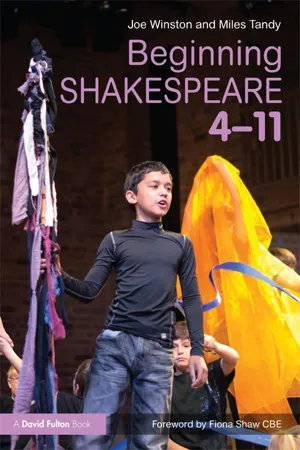
- 128 pages
- English
- ePUB (mobile friendly)
- Available on iOS & Android
Beginning Shakespeare 4-11
About this book
'This book is clear, approachable, and true. The elegant simplicity of its good guidance is the product of years of practical experience in the classroom. I wholeheartedly commend it to primary school teachers everywhere.'
Michael Boyd, Artistic Director of the Royal Shakespeare Company
Shakespeare's plays are widely regarded as the greatest inheritance in English literature and recent years have seen a growing interest in introducing them to children in their primary schools. In this book, the authors bring a blend of clear thinking, playful and inventive practice and straightforward practical advice to bear on teaching Shakespeare in the primary school.
Children who encounter Shakespeare early have the opportunity to become comfortable with the plays, their stories, characters and settings, long before they might become intimidated by their associations with exclusivity and 'high' culture. They are also given the chance to become familiar with and absorb his powerful and complex language at a stage when they are constantly encountering new vocabulary. To do this most effectively demands a dynamic pedagogy, one which recognises that the plays are best explored and understood through active, physical engagement.
Beginning Shakespeare 4-11 offers a sound rationale for teaching Shakespeare in primary schools and shows how to engage children with Shakespeare through story, through the very best of early years practice, and through his rich and sensual language. It also illustrates how engagement with the plays and their language can have a dramatic impact on children's writing. And because plays are for performing, there is helpful and practical advice on how to develop the work and share it with the whole school, parents and the wider community.
This accessible and comprehensive guide is ideal for teacher trainees and practising primary teachers everywhere.
Tools to learn more effectively

Saving Books

Keyword Search

Annotating Text

Listen to it instead
Information
Table of contents
- Front Cover
- Half Title
- Title Page
- Copyright
- Dedication
- Contents
- Foreword by Fiona Shaw
- Acknowledgements
- Introduction
- 1 Beginning Shakespeare with games
- 2 Beginning Shakespeare with his stories
- 3 Beginning Shakespeare in the early years
- 4 Beginning with Shakespeare’s text
- 5 How Shakespeare can inspire children’s writing
- 6 Shakespeare, performance and the primary school
- 7 Shakespeare, ambition and achievement
- Appendix: The story of Prospero’s lost dukedom
- Notes
- Suggestions for further reading
- Index
Frequently asked questions
- Essential is ideal for learners and professionals who enjoy exploring a wide range of subjects. Access the Essential Library with 800,000+ trusted titles and best-sellers across business, personal growth, and the humanities. Includes unlimited reading time and Standard Read Aloud voice.
- Complete: Perfect for advanced learners and researchers needing full, unrestricted access. Unlock 1.4M+ books across hundreds of subjects, including academic and specialized titles. The Complete Plan also includes advanced features like Premium Read Aloud and Research Assistant.
Please note we cannot support devices running on iOS 13 and Android 7 or earlier. Learn more about using the app